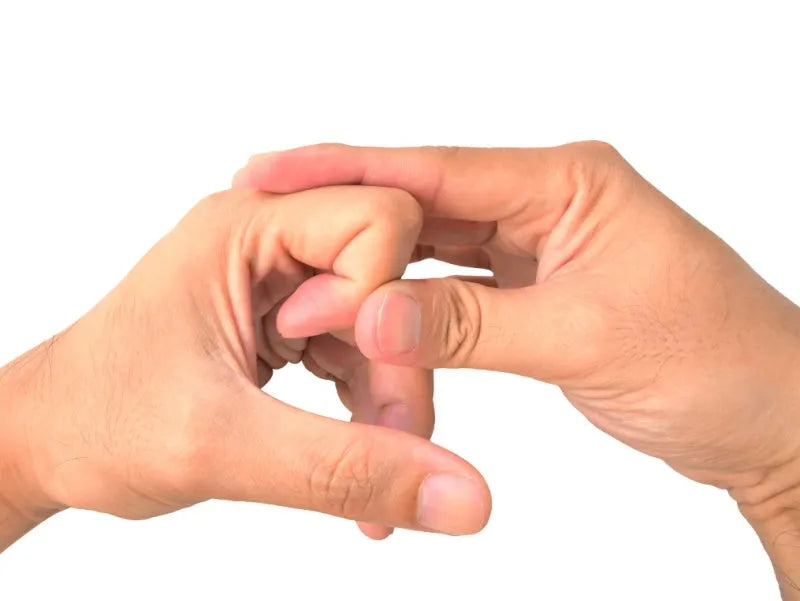
What Joint Popping Means and When to Be Concerned: Decoding the Sounds of Cracking Joints
We’ve all experienced it – that unmistakable pop or crack when you stand up, stretch, or bend your knees. Some people even go out of their way to crack their knuckles, feeling satisfied with each snap. But what do those sounds really mean, and should you be concerned when your joints start sounding like a bowl of Rice Krispies?
Why Do Joints Pop?

The popping or cracking sound you hear when you move your joints is a common occurrence, and in most cases, it’s harmless. Here are a few reasons why it happens:
Gas Bubbles: Our joints are surrounded by synovial fluid, which acts as a lubricant to help them move smoothly. Sometimes, movements cause gas bubbles (mainly nitrogen, carbon dioxide, and oxygen) within this fluid to collapse or "pop," creating that familiar cracking sound.
Ligaments and Tendons: As you move, your ligaments and tendons may shift slightly out of place and then snap back to their original position. This can also create popping noises, especially around the knees or shoulders.
Joint Motion: With aging, wear and tear, or repetitive movements, joints may become rougher, and when cartilage loses its smoothness, certain motions can cause cracking or popping sounds as bones glide over each other.
When Joint Popping Is Normal

For most people, occasional joint cracking is normal and not a sign of anything serious. It’s usually painless and doesn’t lead to long-term problems. If you experience any of the following, there’s likely no need for concern:
- No Pain or Swelling: If the popping doesn’t come with discomfort, swelling, or a feeling of instability, you’re likely in the clear.
- It Happens Infrequently: If joint cracking is occasional and tied to specific movements (like standing after sitting for a long time or stretching after exercise), it’s probably just your body adjusting.
You might be one of those people who crack their knuckles habitually – don’t worry, it won’t cause arthritis, despite what you may have heard!
When Joint Popping Could Be a Problem

Although most joint popping is benign, there are situations when it could signal a deeper issue. Here are some red flags to watch for:
Pain Accompanies the Popping: If your joints pop and it’s painful, it could be a sign of an underlying issue. Pain along with popping might point to ligament damage, tendinitis, or cartilage wear.
Swelling or Warmth: Inflammation, swelling, or warmth around a joint along with cracking sounds could be signs of an injury or arthritis. Osteoarthritis, in particular, can cause joints to creak due to the breakdown of cartilage, leading to bones rubbing against each other.
Joint Instability: If your joint feels loose or unstable, or if you experience locking or catching sensations in addition to popping, it could indicate ligament or cartilage damage. For example, meniscal tears in the knee can cause the joint to pop and lock up.
Limited Range of Motion: When popping is associated with a decreased range of motion or stiffness in the joint, it might be a sign of a more serious issue, like frozen shoulder, a torn ligament, or arthritis.
Frequent or Chronic Popping: If the popping is constant or occurs regularly without explanation, it’s worth checking in with a healthcare professional, especially if it’s a new symptom. Chronic joint cracking, especially if you’re also experiencing stiffness or pain, might indicate degenerative conditions like osteoarthritis or bursitis.
When to Seek Help

It’s important to listen to your body. If your joint cracking is accompanied by any of the concerning symptoms listed above, it’s time to seek medical advice. Early diagnosis can make a big difference in treating joint issues effectively.
Visit a Doctor: If pain, swelling, or instability accompanies your joint popping, a doctor or physical therapist can assess your symptoms, order imaging if necessary, and recommend treatments.
Get an Evaluation: A healthcare professional might recommend physical therapy to strengthen the muscles around the joint or use other interventions to help reduce pain and improve function. In more serious cases, joint injections or surgery might be considered, though these are typically last-resort options.
How to Keep Your Joints Healthy

Even if your joint popping is harmless, maintaining healthy joints as you age is crucial. Here are a few ways to take care of your joints:
- Stay Active: Regular, low-impact exercises like swimming, walking, or cycling help keep joints lubricated and strong.
- Stretch Regularly: Stretching helps maintain flexibility and can prevent the stiffness that contributes to popping sounds.
- Maintain a Healthy Weight: Carrying extra weight puts more stress on your joints, especially in the knees and hips, leading to faster wear and tear.
- Support Joint Health: Consider adding joint-friendly supplements to your diet and eat a balanced diet rich in anti-inflammatory foods to support your joint health.
Final Thoughts
For most people, joint popping is just a part of life, and in the absence of pain or other symptoms, there’s usually no reason to worry. However, if your popping joints are paired with discomfort or other warning signs, it’s best to consult a medical professional to ensure everything is functioning as it should. Keep your body moving, care for your joints, and you’ll stay on track for smooth, painless movement through the years.
